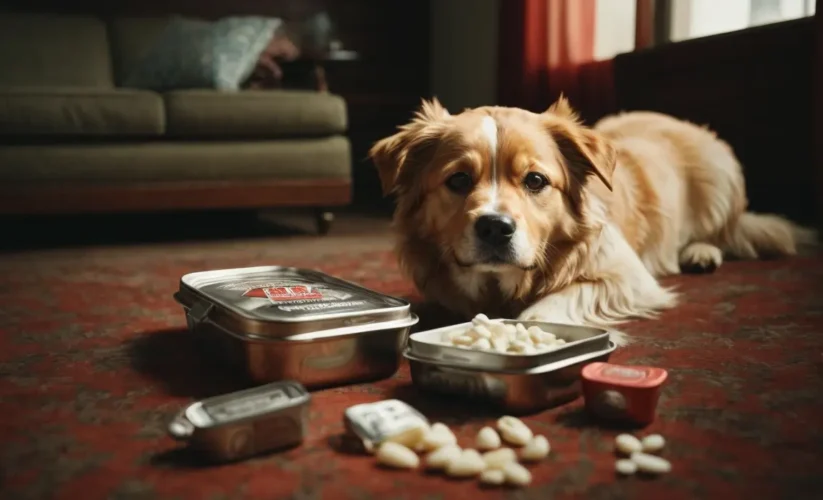Can Dogs Eat Lemon Pepper?

Dogs, our loyal companions, have a way of bringing joy and laughter into our homes. As responsible dog owners, we are constantly exploring ways to ensure their health and happiness. This includes being mindful of what foods we share with them. One such food item that often stirs curiosity among dog owners is lemon pepper. This common kitchen seasoning, known for its tangy and slightly spicy flavor, raises questions about its suitability for canine consumption.
Understanding what is safe and what is not for our furry friends is crucial. Dogs have different metabolic processes compared to humans, meaning some foods that are harmless to us can be toxic to them. This article aims to unravel the mystery surrounding lemon pepper and its impact on canine health.
Is Lemon Pepper Good for Dogs?
When it comes to our furry companions, we often wonder about the safety and health benefits of certain foods. Lemon pepper, a popular seasoning in many kitchens, is no exception. While we might relish its tangy and spicy flavor in our meals, the question arises: is it equally suitable for dogs? This section delves into the composition of lemon pepper and its potential impact on canine health.
Understanding Lemon Pepper
Lemon pepper is a seasoning blend made from lemon zest and black pepper, often accompanied by salt and other spices. Its primary components, lemon and pepper, have distinct properties that can affect dogs differently.
Lemon in the Mix
The lemon zest in lemon pepper is rich in vitamin C and antioxidants. Vitamin C is a vital nutrient for dogs, though they can synthesize it in their bodies. Antioxidants help in combating free radicals, potentially reducing inflammation and boosting the immune system. However, the citric acid in lemons can be a cause for concern. While not toxic, it can lead to stomach upset in some dogs, especially in large quantities.
Black Pepper: A Spicy Addition
Black pepper, the other key ingredient, is generally considered safe for dogs in small amounts. It contains piperine, a compound that has anti-inflammatory and antioxidant properties. These can aid in digestion and improve overall health. However, excessive black pepper can cause sneezing, gastrointestinal upset, or respiratory discomfort in dogs.
The Good and the Questionable
While the individual components of lemon and black pepper may have some health benefits, the combination, as found in lemon pepper seasoning, can be tricky. Commercial lemon pepper often includes additional ingredients like salt, garlic, and onion powder. High salt content can lead to increased thirst, urination, and even sodium ion poisoning in extreme cases. Garlic and onion are particularly harmful to dogs, even in small amounts, causing oxidative damage to red blood cells and leading to anemia.
Moderation is Key
Given these factors, lemon pepper should be approached with caution. If you are considering adding lemon pepper to your dog’s diet, it is essential to do so sparingly and infrequently. The safest approach is to use a homemade blend, ensuring it contains only dog-safe ingredients and no added salt, garlic, or onion.
Potential Benefits in Small Doses
In controlled amounts, the anti-inflammatory and antioxidant properties of black pepper, coupled with the vitamin C in lemon zest, could offer some health benefits to dogs. These include aiding digestion, improving skin health, and potentially enhancing immune function. However, these benefits should be weighed against the possible risks, especially considering the varied ingredients in commercial lemon pepper blends.
Consultation with a Veterinarian
Before introducing any new food item, including lemon pepper, into your dog’s diet, it’s advisable to consult with a veterinarian. They can provide guidance based on your dog’s specific health needs, dietary restrictions, and overall wellness.
In summary, while lemon pepper is not inherently harmful to dogs, its suitability largely depends on the ingredients and the amount consumed. The occasional sprinkle of a dog-safe lemon pepper blend might not pose a significant risk, but it’s crucial to monitor your dog for any adverse reactions. As with any dietary change, moderation and veterinary guidance are key to ensuring the health and well-being of our beloved canine companions.
Is Lemon Pepper Bad for Dogs?

The debate over what is safe for our dogs to eat is an ongoing one, and when it comes to spices like lemon pepper, it’s essential to tread carefully. While we have established that lemon pepper, in moderation, may not be harmful, it’s crucial to understand the potential risks and why it might be a bad idea to include it in your dog’s diet regularly.
Composition of Lemon Pepper
Lemon pepper is a seasoning blend that typically contains lemon zest, black pepper, and often salt, garlic, onion powder, or other spices. The individual components of lemon pepper each carry potential risks for dogs.
Citrus Concerns
Lemon, a primary ingredient in lemon pepper, is high in citric acid. While not toxic, citric acid can cause stomach upset in dogs, especially if consumed in large amounts. Dogs have a more sensitive digestive system compared to humans, and the acidity in lemons can lead to vomiting, diarrhea, or even more severe gastrointestinal distress.
Spices and Canine Health
The black pepper in the mix, though less concerning, can still cause problems if consumed in large quantities. It can irritate the dog’s nose and lungs, leading to sneezing and respiratory discomfort. Furthermore, the additional spices like garlic and onion are more problematic. Both are toxic to dogs and can cause oxidative damage to red blood cells, leading to anemia. Even small amounts of these ingredients can be harmful over time.
Commercial Lemon Pepper Risks
Most commercial lemon pepper seasonings contain more than just lemon and pepper. They often include high levels of sodium, which is detrimental to canine health. Excessive salt intake can lead to increased thirst, urination, and even sodium ion poisoning in severe cases. The additional preservatives and artificial flavors common in these blends can also pose health risks, potentially leading to allergic reactions or food intolerance.
The Risk of Overconsumption
If a dog consumes lemon pepper in large quantities, the risks become more pronounced. The combined effects of citric acid, excess sodium, and toxic spices can lead to a range of health issues, including gastrointestinal upset, dehydration, kidney damage, and in severe cases, neurological problems.
Symptoms to Watch For
If your dog has consumed a significant amount of lemon pepper, be on the lookout for symptoms like excessive thirst, diarrhea, vomiting, lethargy, and loss of appetite. In cases of extreme overconsumption, symptoms might escalate to tremors, seizures, or coma, necessitating immediate veterinary attention.
Long-Term Health Implications
While a one-time small ingestion of lemon pepper may not cause lasting harm, regular consumption can have long-term health effects on dogs. Chronic exposure to the harmful components in lemon pepper can lead to ongoing gastrointestinal issues, kidney damage, and even contribute to the development of certain chronic diseases.
Safer Alternatives
Given the risks associated with lemon pepper, it’s advisable to consider safer alternatives for flavoring your dog’s food. There are many dog-friendly herbs and spices that can add flavor without the health risks. Options like parsley, turmeric, and basil are not only safe but can offer health benefits.
In conclusion, while lemon pepper is not acutely toxic, it poses several risks that make it unsuitable for dogs, especially in regular or high quantities. The combination of citric acid, potential toxic spices, and high sodium levels can lead to a variety of health issues. As responsible pet owners, it’s crucial to prioritize the safety and well-being of our furry friends by choosing dog-safe food options and consulting with veterinarians about any dietary changes. Remember, what’s flavorful for us might not always be the healthiest choice for our canine companions.
What Should You Do if Your Dog Eats Lemon Pepper?
Discovering that your dog has ingested lemon pepper can be alarming for any pet owner. Given the potential risks associated with this seasoning, it’s crucial to know the appropriate steps to take to ensure your dog’s safety and well-being. This section outlines what you should do if you find yourself in this situation.
Assess the Situation
Firstly, try to determine how much lemon pepper your dog has consumed. If it’s a small lick or a taste, the risk might be minimal. However, if your dog has ingested a significant amount, especially if the lemon pepper contains toxic ingredients like onion or garlic powder, the situation is more serious.
Factors to Consider
Consider the size of your dog and the quantity of lemon pepper ingested. Larger dogs may tolerate small amounts better than smaller breeds. Also, take into account the specific ingredients in the lemon pepper seasoning, as some blends may be more harmful than others.
Immediate Actions
If your dog has consumed a considerable amount of lemon pepper, immediate action is required. Here are the steps you should follow:
- Remove the Source: Ensure that your dog no longer has access to the lemon pepper or any food containing it.
- Observe for Symptoms: Look out for any signs of distress such as vomiting, diarrhea, excessive thirst, lethargy, or abnormal behavior. These symptoms can manifest quickly or may take a few hours to appear.
- Offer Water: Provide your dog with plenty of fresh water. This can help to dilute the concentration of the seasoning in their system and reduce the risk of dehydration.
When to Contact Your Veterinarian
If your dog shows any signs of illness after consuming lemon pepper, contact your veterinarian immediately. Even if there are no immediate symptoms, it’s a good idea to call your vet for advice, particularly if a large amount was consumed or if the lemon pepper contained toxic ingredients.
What to Inform the Vet
When you speak with your veterinarian, be ready to provide information about:
- The approximate amount of lemon pepper consumed.
- The time of ingestion.
- The ingredients of the lemon pepper seasoning.
- Any symptoms your dog is exhibiting.
Veterinary Intervention
Depending on the severity of the situation, your veterinarian may advise you to bring your dog in for an examination. Treatments may include:
- Inducing Vomiting: If the ingestion was recent, the vet might induce vomiting to prevent further absorption of the toxins.
- Activated Charcoal: This can be administered to absorb toxins that are still in the gut.
- IV Fluids: In cases of dehydration or to support kidney function.
- Monitoring and Supportive Care: Continuous monitoring and supportive care may be necessary for severe cases.
Preventative Measures
Prevention is key in avoiding similar incidents in the future. Keep lemon pepper and other potentially harmful foods out of your dog’s reach. Educate yourself and your family about dog-safe foods and the dangers of certain human foods and seasonings.
In conclusion, while a small amount of lemon pepper might not pose a significant threat to your dog, larger quantities or lemon pepper with toxic ingredients can be harmful. Prompt action, observation, and consultation with your veterinarian are crucial steps in ensuring your dog’s health and safety. By being vigilant and proactive, you can help prevent adverse reactions and keep your beloved pet healthy and happy.
Final Thoughts
As we reach the end of our discussion on whether dogs can eat lemon pepper, it’s important to reflect on the key insights and takeaways from this topic. Our primary goal as dog owners is to ensure the well-being and health of our furry companions, and understanding their dietary needs plays a crucial role in achieving this.
The Essence of Caution
The overarching theme in feeding dogs human food, including lemon pepper, is caution. Dogs have different digestive systems and dietary requirements compared to humans. What may be a harmless seasoning for us can have adverse effects on them. Lemon pepper, with its combination of citrus and spices, sits in a gray area where its safety is conditional.
Potential Risks
As we’ve explored, lemon pepper poses potential risks due to its ingredients. Citrus elements, while not toxic, can cause stomach upset. The spices, particularly in commercial blends that may include onion and garlic, present a more significant danger. These ingredients are known to be toxic to dogs and can cause serious health issues.
Moderation and Monitoring
If your dog happens to ingest a small amount of lemon pepper, it’s usually not a cause for immediate alarm. However, monitoring your pet for any signs of discomfort or illness is essential. Severe or persistent symptoms warrant a visit to the veterinarian. Remember, what might be a negligible amount for a large dog could be significant for a smaller one.
Knowledge is Power
Educating ourselves about the foods that are safe and those that are harmful to our pets is vital. By understanding the specific dietary needs and potential hazards, we can make informed decisions about what we share with them.
Consultation with Professionals
Always consider consulting with a veterinarian before introducing any new food item into your dog’s diet. They can provide tailored advice based on your dog’s health, breed, and dietary needs.
Conclusion
In summary, while lemon pepper is not inherently toxic to dogs, it’s not advisable to include it in their diet. The risks associated with its ingredients, especially in commercial blends, outweigh the potential benefits. As responsible pet owners, we should focus on providing our dogs with foods that are not only safe but also beneficial for their health.
Let’s remember that our dogs rely on us to make the best choices for their health and happiness. By choosing their foods wisely and being cautious about what we share with them, we can ensure they live long, healthy, and joyful lives by our sides.










